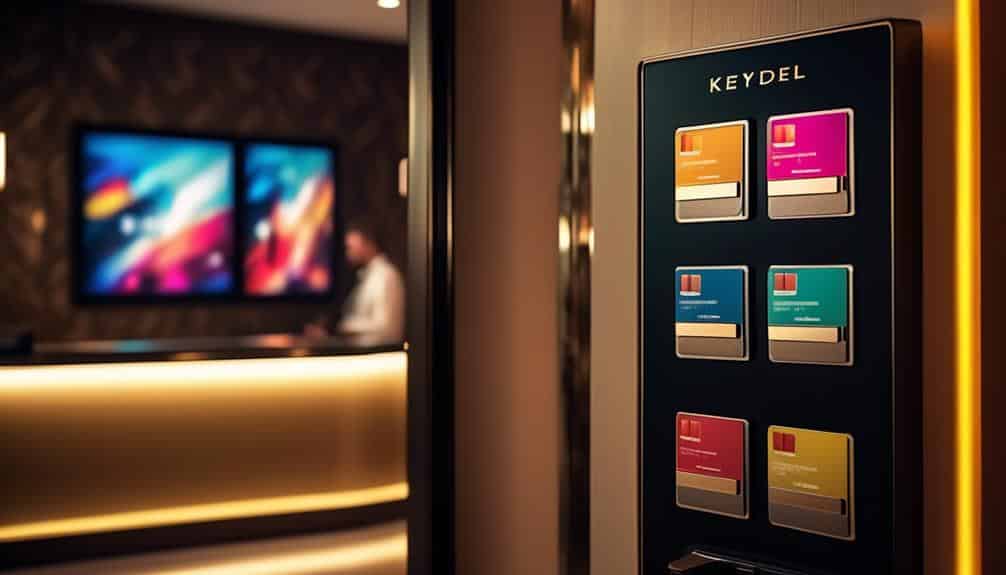As we were preparing for our much-anticipated trip, my travel companion and I stumbled upon a fascinating topic: the best key systems for hotels. Intrigued by the idea of exploring the world of secure hotel access, we embarked on a journey to uncover the top four key systems in the industry.
Little did we know that our findings would not only revolutionize the way hotels operate, but also make us question our own security preferences.
So, join us on this captivating exploration as we unveil the hidden gems that will redefine your hotel experience.
Traditional Master Key System
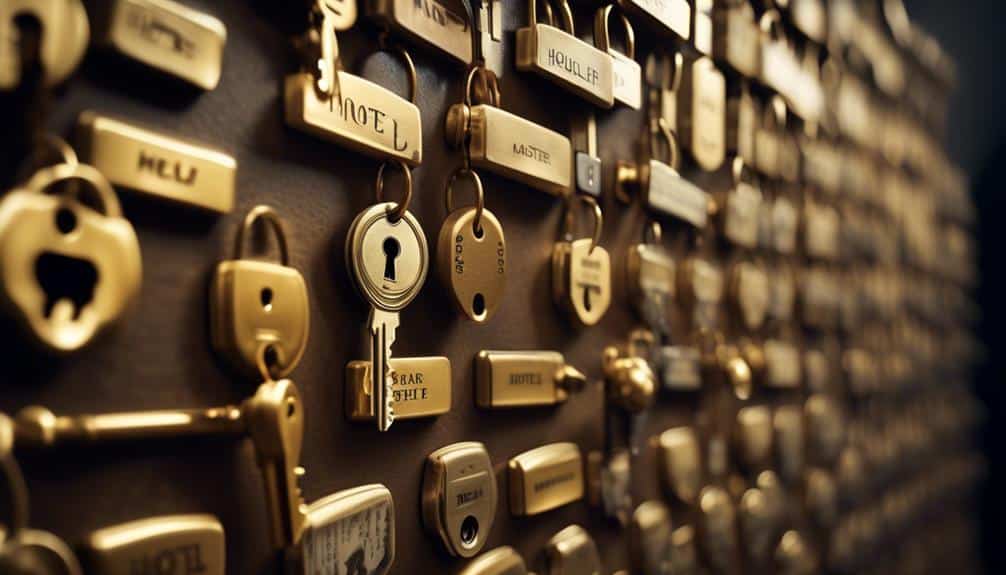
We, as hotel owners or managers, often rely on a traditional master key system to efficiently manage access to various areas within our establishment. The traditional master key system offers several advantages in terms of hotel security.
Firstly, it provides us with a centralized control over access, allowing us to easily grant and revoke permissions as needed. This ensures that only authorized personnel have access to restricted areas, reducing the risk of theft or unauthorized entry.
Additionally, the system offers convenience as it eliminates the need for multiple keys for different areas. This saves time and effort for both staff and guests.
However, implementing and managing a traditional master key system in hotels can pose certain challenges. One major challenge is the risk of key duplication. Traditional keys can be easily copied, which can compromise security. To mitigate this risk, it's crucial to have strict key control procedures in place.
Another challenge is the potential for lost or stolen keys. In such cases, the entire system may need to be rekeyed, which can be costly and time-consuming. Regular maintenance and audits of the key system are necessary to address these issues.
Electronic Key Card System
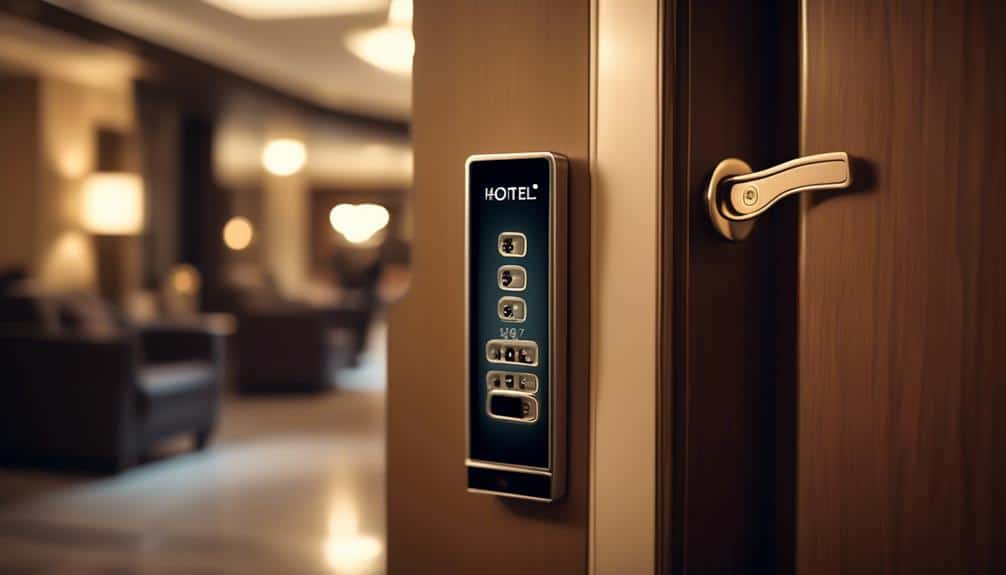
The Electronic Key Card System revolutionizes hotel access control with its advanced technology and streamlined convenience. This system utilizes electronic key cards that are programmed to grant access to specific rooms or areas within a hotel.
One of the main advantages of electronic key card systems is their enhanced security. Unlike traditional keys, electronic key cards can be easily deactivated if lost or stolen, preventing unauthorized access. Additionally, these systems can track and record entry and exit times, providing valuable data for monitoring and improving security measures.
Another advantage is the convenience they offer to both guests and hotel staff. Electronic key cards eliminate the need for physical keys, reducing the risk of key duplication and eliminating the hassle of carrying multiple keys. They also allow for easy customization, enabling hotels to assign different access levels to different cards, ensuring that guests only have access to the areas they need.
However, electronic key card systems aren't without their disadvantages. They can be susceptible to technical malfunctions or power outages, potentially causing inconvenience for guests. Additionally, the initial cost of implementing these systems can be higher compared to traditional key systems.
When choosing the right electronic key card system for your hotel, consider factors such as reliability, compatibility with existing infrastructure, ease of use, and the availability of technical support. It's also important to consider the reputation and track record of the system provider to ensure a smooth and reliable implementation.
Mobile Key System
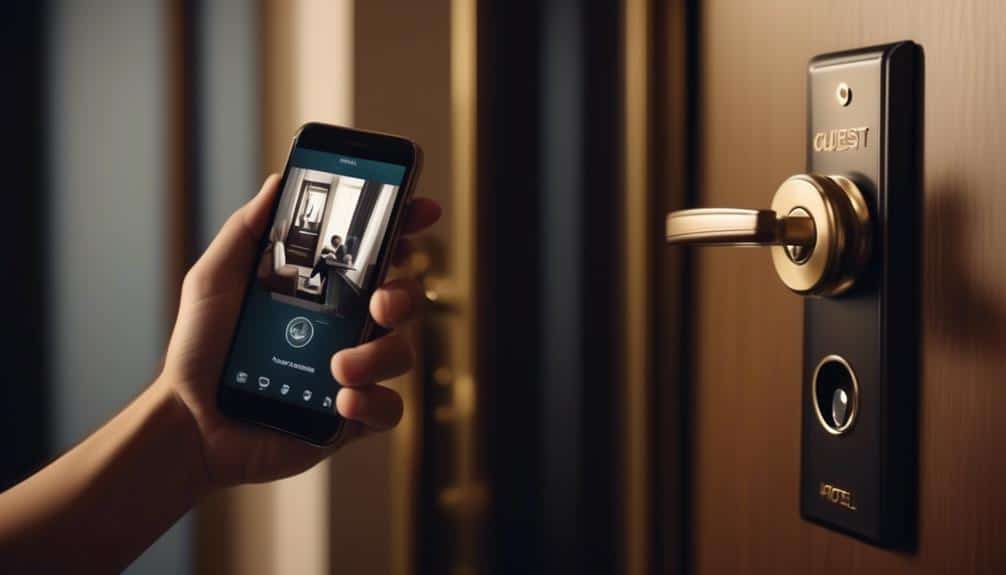
As we explore the advancements in hotel access control, let's now turn our attention to the Mobile Key System, a cutting-edge solution that enhances convenience and security for hotel guests.
The benefits of using a mobile key system are numerous. First and foremost, it eliminates the need for physical key cards, which can be easily lost or misplaced. Instead, guests can simply use their smartphones to unlock their hotel room doors. This not only saves time but also provides a more seamless and hassle-free experience for guests.
In terms of security, a mobile key system offers several features that ensure the safety of guests and their belongings. One such feature is the use of encryption technology, which ensures that the digital key is secure and can't be easily hacked or duplicated. Additionally, mobile key systems often include features such as two-factor authentication, where guests are required to provide a PIN or biometric data along with their digital key to unlock their room. This provides an extra layer of security and prevents unauthorized access.
Biometric Key System
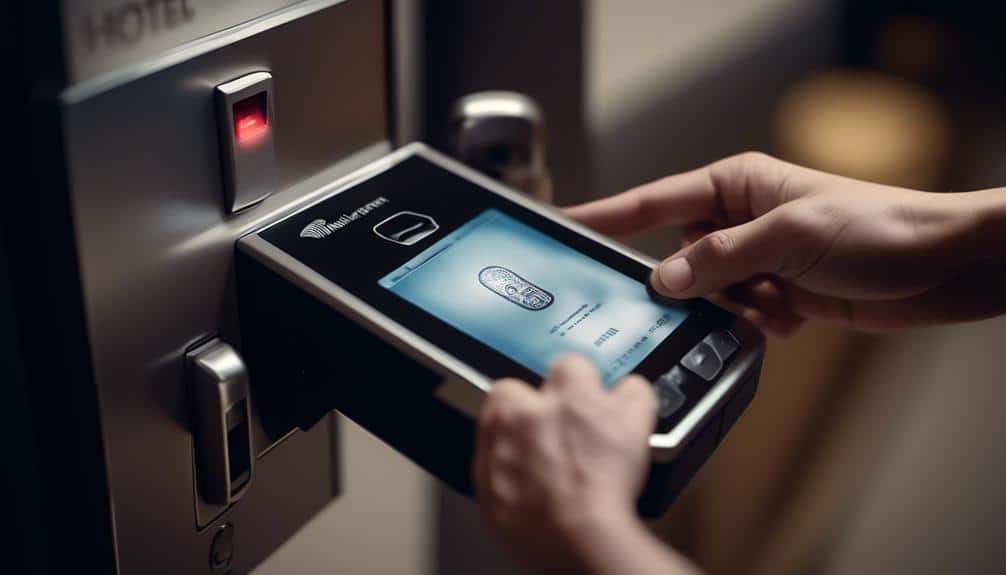
The Biometric Key System revolutionizes hotel access control by utilizing unique physiological characteristics to grant guests secure and convenient entry to their rooms. With the advancement of facial recognition technology, hotels can now identify guests by scanning their faces, ensuring a seamless and contactless check-in experience. This cutting-edge technology not only enhances security but also adds a touch of sophistication to the overall guest experience.
Here are three reasons why the Biometric Key System is the future of hotel access control:
- Enhanced Security: Facial recognition technology provides a highly accurate and reliable method of authentication, eliminating the risk of lost or stolen key cards. This ensures that only authorized guests can access their assigned rooms, maximizing security and protecting guests' belongings.
- Convenience and Efficiency: By simply scanning their faces, guests can quickly gain access to their rooms without the need for physical keys or key cards. This eliminates the hassle of carrying around multiple cards and reduces the time spent in the check-in process, allowing guests to enjoy their stay from the moment they arrive.
- Personalized Experience: The Biometric Key System can also be combined with fingerprint authentication, further enhancing security and customization. This dual authentication method ensures that only the registered guest can access their room, providing an added layer of protection and personalization.
Frequently Asked Questions
How Much Does It Cost to Implement a Traditional Master Key System in a Hotel?
Implementing a traditional master key system in a hotel can vary in cost based on factors such as the size of the hotel and the specific requirements of the system. A cost comparison and benefits analysis would be needed to determine the exact cost.
However, it's important to consider the benefits of a master key system, such as improved security and convenience for hotel staff. These factors can outweigh the initial investment in the long run.
Can an Electronic Key Card System Be Easily Integrated With Existing Hotel Management Software?
Integrating an electronic key card system with existing hotel management software is a seamless process. We've found that it's as easy as pie to connect the two systems, allowing for efficient management of guest access.
The benefits of using electronic key cards are tremendous – they enhance security, streamline check-in/check-out processes, and provide valuable data for analysis.
What Are the Security Measures in Place to Prevent Unauthorized Access in a Mobile Key System?
To prevent unauthorized access in a mobile key system, several security measures are in place. These include encryption technology to safeguard guest information and prevent cloning of key credentials. Biometric authentication, such as fingerprint or facial recognition, adds an extra layer of security. Additionally, remote deactivation of lost or stolen mobile keys ensures that only authorized individuals can access hotel rooms.
Implementing a mobile key system in hotels offers benefits like convenience for guests and improved operational efficiency. However, there are common challenges to consider, such as compatibility with existing infrastructure and ensuring seamless integration with hotel management software.
Are There Any Limitations or Compatibility Issues When Using a Biometric Key System in Hotels?
When using a biometric key system in hotels, there can be limitations and compatibility issues to consider.
Some limitations may include the need for additional hardware or software integration, as well as potential issues with false positives or false negatives when identifying guests.
Compatibility issues may arise if the biometric system isn't compatible with existing hotel management software or if there are compatibility issues with different devices or operating systems.
It's important to carefully assess these limitations and compatibility issues before implementing a biometric key system in a hotel.
How Long Does It Typically Take to Install and Set up a Biometric Key System in a Hotel?
Installing and setting up a biometric key system in a hotel can vary in terms of the installation timeline. Factors such as the size of the hotel and the complexity of the system can affect the duration. However, with proper planning and coordination, the process can typically be completed within a reasonable timeframe.
Additionally, training requirements for hotel staff on how to use the biometric key system may also need to be considered during the installation process.

